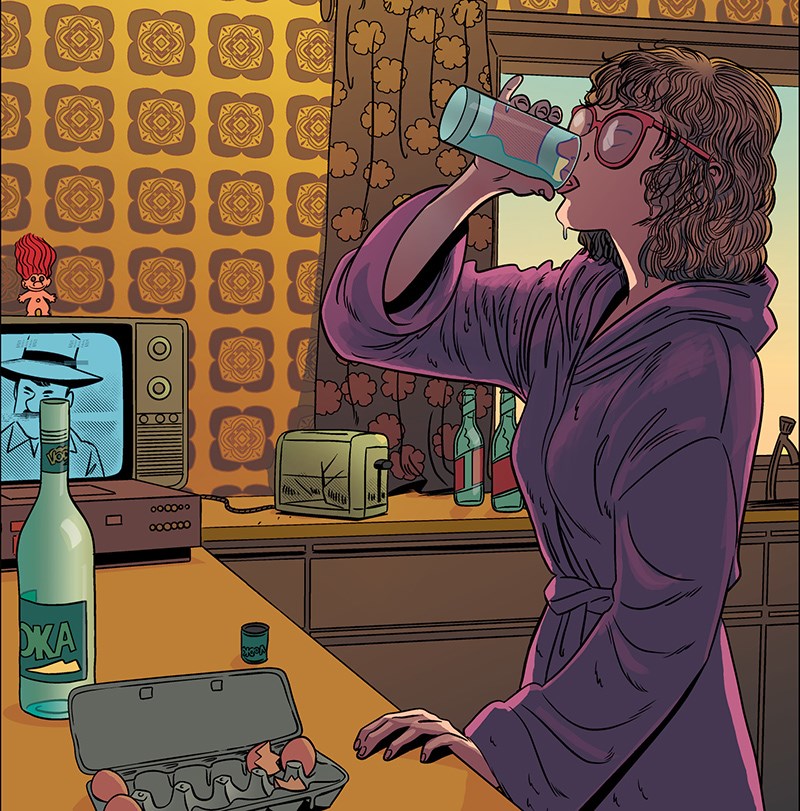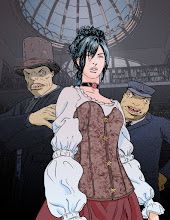It is 1980 in Holland, Michigan. The superstore EVERYTHING has just opened, and as its name suggests, it sells everything. Quickly, the department store becomes almost a temple, a place of worship, where the town's residents find happiness. Of course, there will be exceptions, like Rick Oppstein, a Vietnam veteran who owns a sound equipment store and, for some reason, does not succumb to the enchantment of EVERYTHING. Rick will embark on an investigation worthy of a paranoid war veteran, with the incentive that maybe, just maybe, Rick is right, and it's not paranoia. In his crusade against the strange superstore, Rick crosses paths with a vigilante seeking revenge for his family. And he crosses with Lori too, a desperate and lonely woman who will go from sadness to happiness without fully understanding it, thanks, of course, to EVERYTHING. On the other hand, within the mysterious organization that has taken over the town is Shirley, the administrator of EVERYTHING. She must be accountable to mysterious bosses immersed in the store's basement and undergo an ethical dilemma witnessed only by a teddy bear. And this apparently gorgeous Teddy Bear, which is much more like a toy, is a strange being created by an elderly toy maker who has become a millionaire with the help of inexplicable agents from another world. There will be much more behind the manipulation that EVERYTHING extends to the residents of Holland, in the midst of the consumerism boom. Truly dark presences with definitely strange purposes, the true intentions of which will only become clear at the end. The truth is that when a teenager newly employed by the store dies under strange circumstances, a series of strange events will be unleashed, involving the aforementioned characters and Eberhard Friendly, the city administrator. Friendly, along with his daughters, will suffer from a strange illness that, of course, emerged when the strange store opened.

EVERYTHING was published by Berger Books, a small imprint from Dark Horse that seeks to provide space for unusual and good comics. And the results of that imprint sometimes are great, like this fantasy set in the early 80s that harks back to the early films of David Cronenberg or the much more recent Black Mirror and Mr. Robot. The cinematic and television references are not coincidental; the writer of EVERYTHING is Christopher Cantwell, co-creator of the impressive series Halt and Catch Fire and also the writer of another beautiful Berger Book, She Could Fly. In EVERYTHING, Cantwell constructs a well-rounded, impeccably told story with characters who become endearing from the start due to their humanity and the realism with which they face implausible situations.
EVERYTHING also features the beautiful artwork of I.N.J. Culbard, in which we can see echoes of artists as diverse as Daniel Torres or the wonderful Rick Tomasso. Culbard's lines are clean and expressive, shining particularly in double-page spreads with complex and visually striking compositions that never distract from the story they tell. There is also great care in the presentation of the comic, which at the beginning of each chapter includes recreations of advertising brochures from the era, loaded with irony.
Although EVERYTHING is a comic with many influences, both in its text and its visuals, it is undeniably a very original work. In its 1980s setting, it distances itself from the nostalgia of something like Stranger Things; here, the characters are not teenagers but rather more or less unsuccessful adults, and the world they face is cruel and lacks the glamour with which the Reagan & Thatcher era is often remembered. Beyond the paranormal, the not entirely explained supernatural phenomena, what can be seen are rather sinister 1980s. EVERYTHING has several possible interpretations: a science fiction story where beings (extraterrestrial, celestial?) find the wrong path to guide humanity, committing catastrophic errors. Alternatively, it could be seen as a satire of consumer society, which had its glory days in that decade—a critique of the alienation of the contemporary world and a misguided vision of happiness. In the current landscape of independent comics, filled with more or less interesting proposals but often treated without depth and falling into commonplaces, EVERYTHING stands out. This book proves that a graphic novel format can tell a story that is engaging, and sophisticated. At the same time, it forces one to think, to question reality; to try to understand the present by looking in the mirror of a not-so-distant past that was never as beautiful as nostalgia makes it seem.

Read it, just read it.











No comments:
Post a Comment